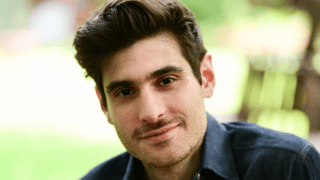The Lavin Agency Speakers Bureau
A speakers bureau that represents the best original thinkers,
writers, and doers for speaking engagements.
A speakers bureau that represents the best original thinkers,
writers, and doers for speaking engagements.
Our empathy is a vital tool for workplace success—one that we can all strengthen through practice.
Great leaders encourage collaboration, promote inclusion, and make their employees feel seen and heard. Their greatest tool? Empathy. Social neuroscience expert JAMIL ZAKI says that empathy isn’t a static trait that people either have or don’t have—we all have the ability to grow our empathy on purpose through practice. Stanford psychologist and author of The War for Kindness, Jamil uses his unmatched expertise in empathy to give us concrete strategies for leadership. He shows us how to lead teams that are connected, collaborative, creative, and ultimately more successful. New York Times #1 bestselling author Adam Grant calls Jamil “one of the brightest lights in psychology. He shows us that kindness is not a sign of weakness but a source of strength.”
“In this masterpiece, Jamil Zaki weaves together the very latest science with stories that will stay in your heart forever.”— Angela Duckworth, author of Grit
Empathy is often stereotyped as a soft skill in organizations. In reality, the opposite is true: empathy is an organizational superpower that makes employees happier, collaboration more efficient, and leadership more effective. Jamil Zaki is an expert in empathy as a practice—something that anyone can build up and get better at over time. As the Director of Social Neuroscience at Stanford University, Jamil’s research has proven that becoming more empathetic in our personal and professional lives creates a more compassionate work culture, enhances our creativity, and bridges differences in a divided world.
In his ground-breaking book The War for Kindness: Building Empathy in a Fractured World, Jamil shares cutting-edge research, including experiments from his own lab, showing that empathy is not a fixed trait—something we’re born with or not—but rather a skill that can be strengthened through effort. In an age where empathy is in short supply, Jamil is a bright light of optimism, giving us the stories of people who are building up their own empathy and fighting for kindness in the most difficult of circumstances. World-renowned Stanford University psychologist Carol Dweck calls The War For Kindness a “landmark book,” saying that Jamil “gives us a revolutionary perspective on empathy: Empathy can be developed, and, when it is, people, relationships, organizations, and cultures are changed.”
Jamil is a professor of psychology at Stanford University and the director of the Stanford Social Neuroscience Lab. Using tools from psychology and neuroscience, he and his colleagues examine how empathy works and how people can learn to empathize more effectively. His writing on these topics has appeared in The New York Times, The Washington Post, The New Yorker, and The Atlantic.

Author, A Brief History of Intelligence AI Entrepreneur and Founder of Bluecore Forbes 30 Under 30 Honoree

New York Times Visionary in Medicine and Science Founding Director of Stanford Brain Organogenesis Knight of the Order of Merit
Cognitive neuroscientist Host of PBS Nova's Your Brain

Author, A Brief History of Intelligence AI Entrepreneur and Founder of Bluecore Forbes 30 Under 30 Honoree

New York Times Visionary in Medicine and Science Founding Director of Stanford Brain Organogenesis Knight of the Order of Merit

County Public Health Director Author of Healing Politics and Medicare for All Host of America Dissected

Author of Grit, the #1 New York Times Bestseller | Pioneering Researcher on Grit, Perseverance, and the Science of Success

Pulitzer Prize-Winning Creator of The 1619 Project | Executive Producer of the Emmy Award-Winning 1619 Project Hulu Docuseries | MacArthur Genius
Nike's Former Chief Marketing Officer | Author of Emotion by Design

New York Times Bestselling Author Of All Boys Aren’t Blue and We Are Not Broken | Emmy Nominee | LGBTQIA+ Activist
CEO of The Atlantic | Former Editor-in-Chief of WIRED

Cynicism—the belief that people are selfish and conniving—has been rising for decades and is an early frontrunner for mood of the 2020s. But when we don’t trust each other, we risk missing out on the things that matter: our health, relationships, and ability to innovate. Cynical thinking is especially dangerous when it creeps into the workplace; if it catches on, it can snuff out creativity and collaboration. If we want our teams to trust each other and share their most innovative ideas, we need to fight this invisible threat.
Stanford psychology professor Jamil Zaki can help. He’s a world leader in the science of human connection, and he’s tackling cynicism in a new way, as he laid out in a brilliant TED Talk that quickly earned over a million views: cynicism is a “trap” that we fall into. When we think cynically, we are more likely to compete, suspect, and alienate others, bringing out the worst in them and spreading cynicism even further. Jamil shows us how to stop this self-fulfilling prophecy so that we can see the best in each other again.
You’ll learn how to diagnose and stamp out the bugs in our thinking that cause cynical attitudes. You’ll be able to correct the common leadership behaviors that inadvertently spread cynicism across organizations, leading to burnout and turnover. Most of all, you’ll learn about “anti-cynicism,” a term that Jamil has coined for a set of practices that actively combat cynical thinking. Anti-cynical workplaces take intentional steps to promote cooperation and trust, and to create healthier, more successful cultures. When you leave Jamil’s talk, you’ll be ready to build an anti-cynical community of your own.


Empathy—the ability to share, understand, and care about others’ experiences—is a key to thriving workplaces, promoting well-being, collaboration, loyalty, and innovation. And it’s a vital element for any successful diversity, equity, and inclusion initiative. But it doesn’t always flow through companies the way it should. Empathic people often rise to positions of leadership and influence, but achieving those goals can ironically make it harder for them to connect. Psychologists call this the “power paradox,” and it can get in the way of building an inclusive organization.
The good news is that empathy is a skill, which anyone can strengthen and learn. In this talk, Stanford psychologist Jamil Zaki shares insights from the behavioral sciences about overcoming the power paradox, including practical techniques for listening more effectively. By training empathic habits of mind, leaders and organizations can use a fundamental human quality to make sure people from all backgrounds and perspectives feel seen, heard, and understood.

Empathy is often stereotyped as a squishy “soft” skill—either irrelevant to, or problematic for, the bottom line. In fact, the opposite is true: empathy is an organizational superpower that makes collaboration more efficient, employees happier, and leadership more effective. Empathy tracks bottom line success and people have caught on. A whopping 85% of CEOs in a recent survey said empathy was important for their bottom line, and over 90% of employees said they’d be more loyal to an empathic company. In the hunt to recruit and keep top talent, making team members feel seen and heard is a key competitive advantage. It also helps orgs cultivate more inclusive and open communities.
So, now that companies are picking up on the value of empathy—what happens next? An increasing number of organizations have started trying to roll out empathy as a corporate value, but the results are often mixed, with many failing in tragic or comic fashions. In the same survey where CEOs sung empathy’s praises, over 90% of their employees said their company wasn’t empathic enough. In other words, there’s a gap between the values leaders are putting on their walls and the reality their teams are experiencing on the ground.